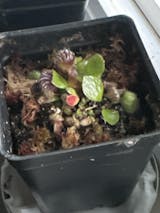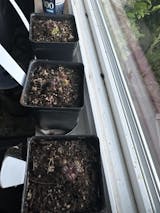Cephalotus follicularis Potted
Cephalotus follicularis is one of the most desired carnivorous plants in cultivation, it is a curious pitcher plant with compact growth, with bristly, colorful traps that are seemingly yawning for a bite to eat!
Please be aware that this can be a bit tricky to grow. Be sure to read through all of our care instructions and for more information click here to watch this video for care tips!
These small plants are no bigger than a nickel but will rapidly grow with proper care.
Care Instructions
Growth habit: Cephalotus are not large plants but produce tons of pitchers, tumbling over one another. They grow paddle-shaped leaves. Over time, the pitchers can grow over the sides of their pots, but they will not grow tall. Pitchers will grow to 3” tall at maximum.
Sun: Full to part sun. They can be grown in terrariums and do best under grow lights. Depending on the strength of the light, grow them 6-12” from the grow light. They can also be grown outdoors in full to part sun in mild climates.
Water: Water with distilled, reverse osmosis, or rainwater only. Use the tray method. Cephalotus dislike long periods of being waterlogged, so it is best to allow the water in the tray to evaporate before adding more. Do not fill trays more than 1/4 of the way up the pot. Always use drained containers; shallow, un-drained containers will rot their roots.
Temperature: Daytime temperatures in the 60s-90s with a 10-20 degree drop in night temps, they can tolerate light frost. Cephalotus does best with moderately warm summers and cool to chilly winters. The plants may die in prolonged periods of very hot weather but enjoy cool summer nights. They tolerate brief, light frost down to 20 F degrees but may be killed in lower temperatures. They are best grown in cool highland greenhouses or terrariums. They can be grown outdoors year-round in mild areas.
Dormancy: Cephalotus have no winter dormancy but may grow slowly in the winter.
Fertilizer: Apply diluted Maxsea fertilizer once or twice a month to the leaves and inside the pitchers. Slow-release osmocote pellets can be added to the pitchers with distilled water. Small pitchers may burn back upon feeding, but this will still greatly benefit the plant with nutrients. Small insects can also be fed to pitchers.
Soil & Repotting: Cephalotus do well in a quick drying soil mix. We use two parts sand to one part peat moss. Do not grow them in very water heavy soil mixes. Cephalotus do not like repotting and have stiff, woody roots so be very mindful when transplanting to be gentle. Repot every 3-5 years, they prefer tall pots.
More Information: For more information on repotting, pests, growing habits, and more, check out our FAQ page or our YouTube channel!








